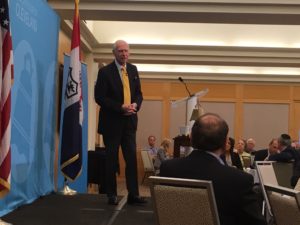Economic inequality is threatening to destroy capitalism in America, and the only people that can save capitalism are the people who are benefiting from it the most. That is the message of Peter Georgescu, Chairman Emeritus of the global marketing and advertising firm Young and Rubicon. Georgescu has written about his concerns in a book titled Capitalists Arise. Yesterday he spoke about his concerns at the Cleveland City Club.

Peter Georgescu at the Cleveland City Club.
Free-market capitalism is the best system ever designed for creating wealth, he said. Capitalism has lifted billions of people out of abject poverty across the globe, created America’s middle class, and funded America’s rise as a great power. But the capitalist system that has done so much good is in peril. Not because of the lure of competing systems, but because of capitalism’s own failure to provide opportunity to all citizens.
“I am afraid we are going to kill the golden goose,” he said.
Today, capitalism works for just the top 20 percent of Americans, said Georgescu. “For the upper 20 percent of Americans, life is good.” he said. “But 70 to 80 percent of Americans are in deep trouble.” Sixty percent of Americans increase their debt load every year. They are functionally insolvent and are at risk for financial catastrophe if struck by an unexpected event, like loss of a job, high medical bills, or even an expensive auto repair.
Income inequality is exacerbated by the physical separation of American society into enclaves of prosperity and enclaves of poverty, co-existing side-by-side. “We have achieved complete success at segregating ourselves by income with disastrous consequences,’’ he said.
The result is a vicious cycle where residents of poorer neighborhoods suffer from increasingly poor services, fewer opportunities, and a loss of hope, while residents of prosperous neighborhoods are shielded from the impact of economic inequality.
The disastrous consequences for most Americans include bad schools, virtually no early childhood education, escalating consumer debt, few jobs, high unemployment, stagnant wages, drug and alcohol addiction, and a dramatic drop in life expectancy.
America’s low labor participation rate disguises the nation’s true level of unemployment, he said. “Unemployment in this country is not 3.7 percent,” said Georgescu. “That’s ridiculous. Look at the labor force participation rate, which is near historical highs.” People leave the labor force when they become discouraged. “People give up,” he said. “These are not lazy people; they are desperate people. That’s what the opiate crisis is all about.”
For forty years America’s system of free-enterprise capitalism generated wealth for most Americans, said Georgescu. Business received “humongous advantages” in the form of favorable tax rates, limited liability, and public investments in infrastructure and education. In return, business promised to behave like a good citizen by treating people fairly. Business leaders were committed to stakeholder capitalism, where the fruits of capitalism – profits – were shared with customers, employees, the corporation, shareholders, and society.
By following this simple model, American business worked magnificently, he said, providing wealth to a majority of Americans and strengthening the nation. “But today, that beautiful machine is in trouble.”
Beginning forty years ago, the focus of business shifted from socially responsible, long-term-focused stakeholder capitalism to a focus on one stakeholder: shareholders, to the exclusion of everything else, Georgescu said. Shareholder primacy has led companies to favor short-term profits over the long-term health of the corporation and society. As a result, businesses have reduced investments in employees, facilities, productivity, and society.
“The change from multiple stakeholders to shareholder primacy happened gradually, slowly over time, without a clear understanding of what the consequences would be,” he said. Most businesses now view employees as a cost to be lowered by holding down wages, limiting benefits, cutting training, and replacing workers with machines. “Instead of using technology to help people become more productive, we have used technology to get rid of people,” he said. “But these are the people that add value and generate productivity.”
The results have been disastrous.
“Signs of unrest are everywhere now,” he warned. “When an inequality crisis gets too severe, it solves itself in one of two ways: society redistributes wealth through taxation, or poverty gets redistributed through revolution.”
Nearly all CEOs that he has discussed this with agree with his analysis, he said, but they often don’t know what they can do. They fear they will be ousted by shareholders if they reduce shareholder rewards. But some companies are already moving away from shareholder primacy said Georgescu, citing Delta Airlines, Home Depot, Costco, Microsoft, Amazon, and Google as examples. These companies – and others – invest in research and they invest in long term outcomes, not short term. They are not perfect, but good, he said.
Business has a responsibility address inequality, he said, because business is primarily responsible for creating the problem. Government didn’t create this problem and government cannot solve it. Government can assist, but the heavy-lifting must be done by business.
What can business do? The starting point, he said, “is to reinvent the relationship between the corporation and employees. We cannot allow employees to be totally disregarded.” In addition, “business needs to be honest, fair, and just to all of society.” Business must act now and with urgency, he said. Business and government must collaborate to create a more just, more fair, and more productive society. Business must stand for human value, morality, and truth.
Who can make the changes necessary? Boards of directors, shareholders, banks, government, CEOs – all must pull together, he said. “But today’s CEOs must lead the change.”
“We know what to do,” said Georgescu. But it will not be easy. “It is hard going. We are working against the clock.”
For more information, see Capitalists Arise, by Peter Georgescu and David Dorsey; Berrett-Kohler Publishers, Inc.; Oakland, CA; 2017. https://petergeorgescu.com/books/capitalists-arise/
June 15, 2019
